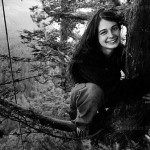“To recognize death and mortality and to live fully with that awareness is to know the only true idea of the holy available to man in this or any other century.”
— John Vickery, The Literary impact of The Golden Bough
We’ve just come back from our family vacation to Utah — which means I’m back from my blogging vacation as well.
We drove out from Indiana, which is a two day trek across Illinois, Iowa, Missouri, Kansas, Colorado, and Utah. I believe I-70 west of Denver offers one of the most beautiful stretches of scenery available from an Interstate in the U.S. For someone raised east of the Mississippi, driving through the Rockies can be a religious experience in itself. (Unfortunately, you’re driving at 65+ mph and the driver has to negotiate both the speeding traffic and the tight turns, which makes appreciating the view nearly impossible.)
When we arrived in Utah, my father-in-law took us to the top of the mountain range in the Manti-La Sal National Forest, which my wife’s hometown lies at the foot of. There were still patches of snow on the ground. And there were several small lakes reflecting the summer sky, which seemed much closer standing on the top of the mountain than when we were in the valley.

I was surprised to find that, even in a drought year, the land was bright green, unlike in the valley. Like Hildegaard of Bingen, I associate my experience of God with greenness (Hildegaard called it “veriditas”). I grew up in Kentucky, West Virginia, and southern Indiana, all very green places. I’ve never resonated with the desert, despite the best efforts of my BYU geology professor. But there are pockets of greenness in Utah. And as I climbed the densely forested mountain slopes, I felt like I had come home. I had a strong sense that I was my truest self in that place. I felt that same feeling very strongly not too long ago among the redwoods in Muir Woods in California. No experience that I have ever had in a formal religious context has ever compared to the feeling of rightness that I consistently feel when hiking in a forest.
But it wasn’t just Utah that I enjoyed. The drive out was special too. I even enjoyed the long stretches of green pastures and fields in Kansas. In fact, I especially enjoyed Kansas this time. I used to hate driving through farm country. As a child, the hour drive from one grandmother’s home in Indianapolis to another grandmother’s home in Lafayette, Indiana felt like the Bataan Death March. Being strapped into the backseat, unable to see over the rows of corn on both sides was a special torture. But I now find myself enjoying that same stretch of highway and the many others like it. My spirit soars whenever I am able to get out of my office and into “nature”, even if that nature is a cultivated field, and even if I am witnessing it from inside a motor vehicle. It’s not as powerful as when I am hiking in a forest, but it is something nonetheless.
I find myself wondering what has changed between my childhood and now that I enjoy these drives. The contrast is all the more acute since I have children of my own. This past weekend, I hiked with my family up a mountainside to show them a beautiful meadow and a vista I had happened upon. My kids, now 11 and 14, enjoyed the view for all of 10 seconds before becoming distracted. The same thing happened on the drive through Glenwood Canyon west of Denver. It was a struggle to tear them away from their electronic devices to appreciate the magnificence all around them. I could blame it on the technology, but I know it is more than that. Parents have been dealing with this phenomenon long before there were iPads (although I’m sure the technology exacerbates the situation). How many parents have driven their children across the country to see the Grand Canyon, only to hear them say, “Wow! … Can we go home now?”

Recently my son expressed delight at seeing a sunset by exclaiming that it looked like a picture. Shouldn’t it be the other way around? For me, and I think for most adults, there is a significant qualitative difference between experiencing a sunset first hand and seeing a picture of one. But I don’t think my kids really appreciate the difference. Again, I could blame it on the new technology, but I don’t think I was all that different as a child. I have often heard people speak about the innate sense of wonder that children experience at the world around them. Two nature writers in particular come to mind: Rachel Carson and Annie Dillard. Rachel Carson writes in Silent Spring:
“A child’s world is fresh and new and beautiful, full or wonder and excitement. It is our misfortune that for most of us that clear-eyed vision, that true instinct for what is beautiful and awe-inspiring, is dimmed and even lost before we reach adulthood. If I had influence with the good fairy who is supposed to preside over the christening of all children I should ask that her gift to each child in the world be a sense of wonder so indestructible that it would last throughout life, as an unfailing antidote against the boredom and disenchantments of later years, the sterile preoccupation with things artificial, the alienation from the sources of our strength.”
And Annie Dillard writes in Pilgrim at Tinker Creek:
“An infant who has just learned to hold his head up has a frank and forthright way of gazing about him in bewilderment. He hasn’t the faintest clue where he is, and he aims to learn. In a couple of years, what he will have learned instead is how to fake it: he’ll have the cocksure air of a squatter who has come to feel he owns the place. Some unwonted, taught pride diverts us from out original intent, which is to explore the neighborhood, view the landscape, to discover at least where it is that we have been so startlingly set down, if we can’t learn why.”
I love these quotes, but I am skeptical about their facticity. I don’t think either Carson or Dillard actually had children at the time they wrote these words. Carson and Dillard had this sense of wonder, as adults, and it is evident in their writing. But I think it is dubious whether they had the same sense when they were themselves children. I have seen my children fascinated by the natural world on occasion, but not consistently so. In my experience, adults are more able to experience awe and wonder of nature than children, and I wonder why.
I asked my wife about it, and she said she thinks it takes a kind of contemplative aptitude to appreciate nature. I also asked my 10 year-old daughter about it, and she said she thinks that it requires patience, which adults have and children lack. I think the two answers are related and close to the mark.
I also think that the experience of wonder requires a certain knowledge. The scale (temporal and spacial) and complexity of nature which science reveals to us can bring adults to their knees (figuratively and literally), but is often lost on children. One geology class turned my wife into a lifelong lover of rocks. A little bit of amateur astronomy and my experience of the night sky is transformed. One night in Utah this past week was particularly clear, and it was spectacular. I’ve lived most of my life in the Midwest, where the humidity acts as a film which blocks the light of all but the brightest stars. I remember the first time I went out into the desert in Utah at night. It was like I had never seen the night sky before. Of course, one need not know anything about biology, botany, geology, etc. in order to marvel at the magnificence of the universe. But it helps.
I do think, though, there may be one item of knowledge which may explain the difference between how adults and children experience the natural world. It is something that children really do not know and that only slowly comes into the awareness of adults as we age. It is the knowledge that we are going to die. Standing under the night sky, staring up to stars so thick I feel like a could scoop them up into my hands, my awareness of my own mortality transforms my experience from a purely aesthetic one to a spiritual one. I am no longer just seeing something beautiful; I am changed, humbled by the vastness of the universe manifest before me. Hiking up a mountain trail and cresting the peak to look down into the valley, I am not just exercising my limbs. I am throwing myself up against the mountain, straining against the limits of physicality, limits which foreshadow the Limit which is placed on every life. Driving through Glenwood Canyon along the Colorado River, knowing that this beauty existed long before me and will continue to be long after I am gone, fosters in me a sense of gratitude for the brief but magnificent opportunity that is my life.
These are experiences that are lost on my children. They are lost on them because they do not yet know how fleeting life is. They do not really know yet that they will someday die. As we move from childhood into adulthood, we don’t leave an Edenic garden where there is no death. Rather, we come to see the death that we were previously blind to. But this “fall” is a felix culpa or “fortunate fall”, for in coming to the awareness of our mortality, we gain the beauty of the world. In the movie Troy, Achilles tells his lover:
The Gods envy us. They envy us because we’re mortal,
because any moment might be our last.
Everything is more beautiful because we’re doomed.
You will never be lovelier than you are now.
We will never be here again.
So I rest content with my children’s distractedness, knowing that their innocence is what stands between them and them beauty of the earth, and also knowing that one day they will come to know it as I have.











